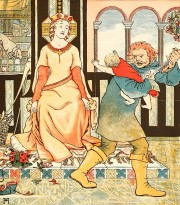|
Home
|
Sep 8, 2020
This week’s themeEponyms This week’s words Ballardian Griselda Homeric Juno Pavlovian 
One of Griselda’s children is taken away from her
Illustration: H.R. Haweis, in Chaucer for Children, 1877
A.Word.A.Day
with Anu Garggriselda
PRONUNCIATION:
MEANING:
noun: A meek and patient woman.
ETYMOLOGY:
After Griselda, a woman in various medieval tales, who suffers without
ever complaining as her husband puts her through various tests. The name
Griselda is from Germanic roots meaning “gray battle-maid”. Talk about
misnaming your character (see below)! Earliest documented use: 14th century.
NOTES:
Griselda has appeared in many stories over the years, including
Geoffrey Chaucer’s The Canterbury Tales, and was the inspiration for
Shakespeare’s The Winter’s Tale. The best-known version of the story
is the one told by Giovanni Boccaccio, c. 1350. In the story, Gualtieri, Marquis of Saluzzo, marries a peasant girl named Griselda. After some time when a daughter is born, Gualtieri decides to test his wife and declares that the newborn is to be killed and sends her away supposedly to be killed. Griselda accepts her husband’s will without ever complaining. A son is born a few years later and again: lather, rinse, repeat. For the final test, he leaves her. After a few years he announces he’s remarrying and asks Griselda to come work as a servant in the wedding. She meekly complies. The woman he’s supposedly marrying is their daughter who is now grown up, all of 11 years old. Seeing Griselda remain steadfast and loyal through all this, he finally declares: It has been a test. Only a test. Congratulations, you passed! The whole family reunites. Happy ending. Good old times! USAGE:
“Quite evidently she is not a Griselda, but possessed with a shocking
desire to exculpate herself and her friends.” Harriet Beecher Stowe; Lady Byron Vindicated; Boston, Fields, Osgood, & Co.; 1870. A THOUGHT FOR TODAY:
If more politicians in this country were thinking about the next generation
instead of the next election, it might be better for the United States and
the world. -Claude Pepper, senator and representative (8 Sep 1900-1989)
|
|
Subscriber Services
Awards | Stats | Links | Privacy Policy
Contribute | Advertise
Awards | Stats | Links | Privacy Policy
Contribute | Advertise
© 1994-2026 Wordsmith